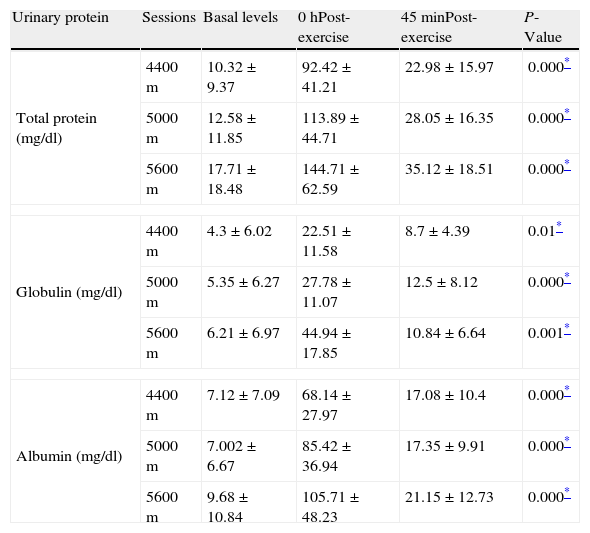Effects of distance running on proteinuria have been evaluated in few studies. This study has been conducted to determine the influences of different distance running, with fixed exercise intensity, on proteinuria in young male football players.
Los efectos en la proteinuria de la distancia de recorrido en carrera han sido evaluados en algunos estudios. Este estudio se ha llevado a cabo para determinar la influencia de las diferentes distancias recorridas, con intensidad de ejercicio fijo, sobre la proteinuria en jóvenes jugadores de fútbol masculino.
Following study on the effects of different intensities of aerobic exercise on proteinuria in football players,1 we examined the effects of different distance running on proteinuria in this group. The participants consisted of ten males whose physical characteristics included: mean age=18±0.5 years, body mass index=21.27±2.14kg/m2, VO2 max=47.6±4.83(ml/kg/min) and regular practice of 6.0±0.55h/week. They played in the premier league at the Fars province of Iran, in the last three years. The participants were otherwise healthy with no history of renal disorders and surgical or medical treatment during prior 6 months. The exercise program was composed of 3 sessions of random distance running (4400, 5000 and 5600m) on treadmill with 85% of maximal heart rate, while there was a 48-h resting period between sessions. During the study, the players were asked to avoid further physical activity, and at nights before sampling, refuse taking meals enriched of fat, proteins, and caffeine. They should also drink enough water to avoid dehydration. Urine samples were taken as basal and immediately and 45min after each session. The samples were assayed, using gel electrophoresis, for main proteinuria indices including: total protein, albumin and globulin. Immediately after exercise, urinary protein (albumin and globulin) rose significantly (P<0.05), then urinary protein declined to lower levels during 45min (P<0.05), however, it was still significantly higher than basal levels only for albumin (P<0.05). Moreover, a significant difference in amount of proteinuria, with positive correlation between distance and proteinuria, was found among sessions, only immediately after exercise (Palbumin=0.003, Pglobulin=0.016) (Table 1). This study revealed that elongation of the running distance with constant exercise intensity results in further proteinuria relating to increased exercise work-load which is self-limited and ameliorates promptly.2 It seems that globulin; because of higher molecular weight has a minor contribution in exercise-induced proteinuria. Particular attention to dietary protein supplementation in athletes and further research surrounding this issue is recommended.
Urinary protein levels at different stages of exercise sessions.
| Urinary protein | Sessions | Basal levels | 0hPost-exercise | 45minPost-exercise | P-Value |
| Total protein (mg/dl) | 4400m | 10.32±9.37 | 92.42±41.21 | 22.98±15.97 | 0.000* |
| 5000m | 12.58±11.85 | 113.89±44.71 | 28.05±16.35 | 0.000* | |
| 5600m | 17.71±18.48 | 144.71±62.59 | 35.12±18.51 | 0.000* | |
| Globulin (mg/dl) | 4400m | 4.3±6.02 | 22.51±11.58 | 8.7±4.39 | 0.01* |
| 5000m | 5.35±6.27 | 27.78±11.07 | 12.5±8.12 | 0.000* | |
| 5600m | 6.21±6.97 | 44.94±17.85 | 10.84±6.64 | 0.001* | |
| Albumin (mg/dl) | 4400m | 7.12±7.09 | 68.14±27.97 | 17.08±10.4 | 0.000* |
| 5000m | 7.002±6.67 | 85.42±36.94 | 17.35±9.91 | 0.000* | |
| 5600m | 9.68±10.84 | 105.71±48.23 | 21.15±12.73 | 0.000* | |



